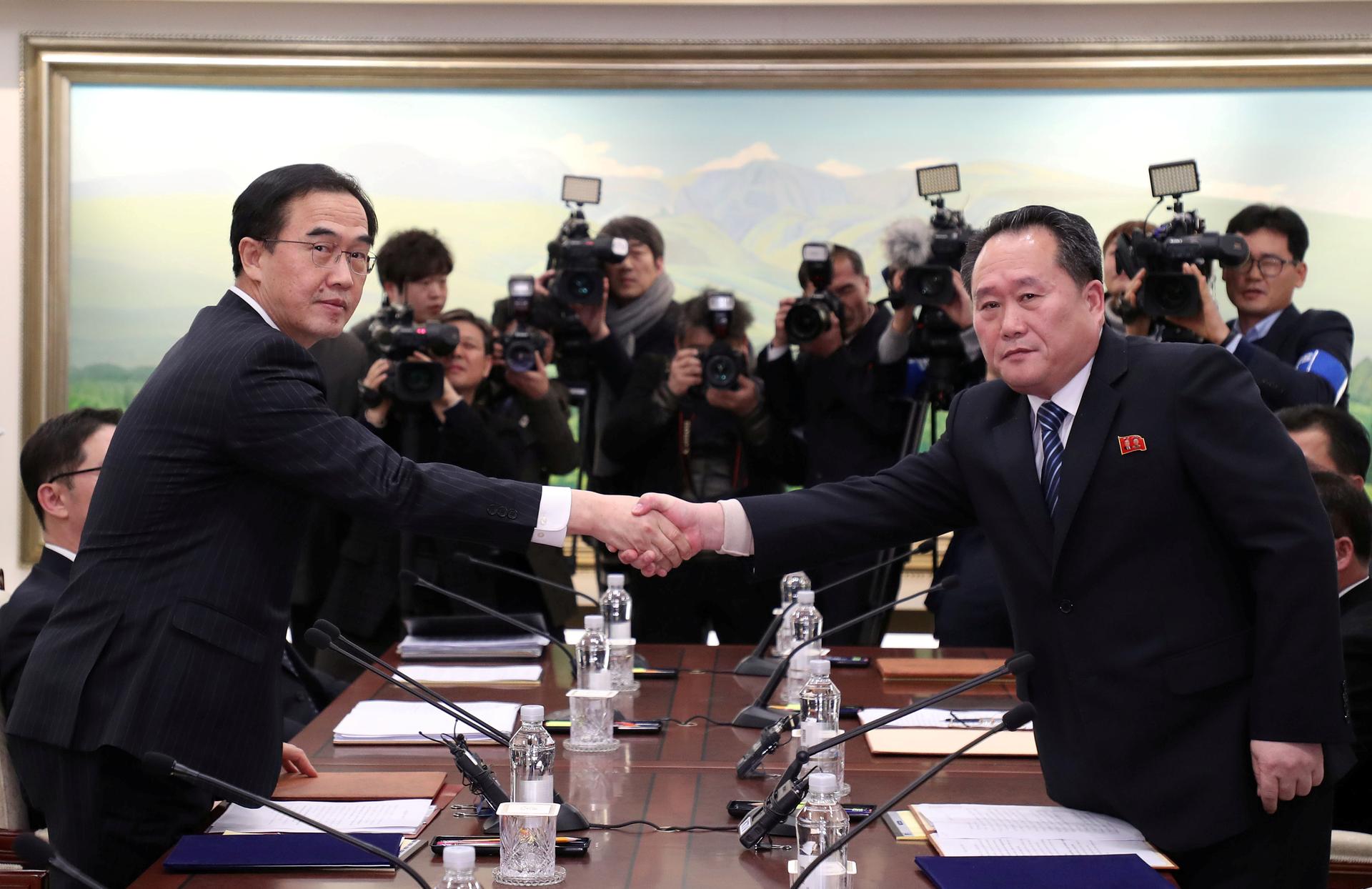Head of the North Korean delegation, Ri Son-gwon (right) shakes hands with his South Korean counterpart Cho Myoung-gyon as they exchange documents after their meeting at the truce village of Panmunjom in the demilitarized zone separating the two Koreas on Jan. 9, 2018.
They met, they talked, they issued a joint statement. And they will meet again.
This is no small matter for North and South Korea, two countries that remain technically at war and whose peninsula in northeast Asia has been cause for global anxiety in recent months.
The war of words between the North’s baby-faced dictator Kim Jong-un and the US's quick-tweeting President Donald Trump has raised the specter of a possible military confrontation that could conceivably include the use of nuclear weapons.
Related: The risks of war with North Korea in 2018
South Korea jumped at the chance to meet with the North Koreans for the first time in two years. Washington welcomed Tuesday’s talks, which lasted 10 to 11 hours.
But what is Pyongyang after here?
Kim most certainly is keen to participate in the Olympic Games hosted by South Korea next month. But Ri Son-gwon, the head of the North Korean delegation that took part in Tuesday’s meeting, suggested that Pyongyang was doing Seoul a favor.
Related: North Korea reopens border hotline with the South
“We came to this meeting today with a serious and sincere attitude and with the thought of giving our brethren, who have high hopes for this dialogue, invaluable results as the first present of the year,” Ri said.
One subject the North did not want to talk about was denuclearization. When the South Korean delegation raised the prospect of re-starting talks on that issue, Ri was reported to reject it outright.
Some experts say Kim Jong-un is feeling emboldened by the rapid progress with his nuclear weapons program in recent months, and that Kim’s real aim is to use this opening with Seoul to drive a wedge between South Korea and its American allies.
Bottom line, the US intelligence community says Kim wants two things. He wants to hold on to his nuclear weapons program. And he wants to stay in power.
“Looking for the simplest explanation is probably the best one,” says William Tobey, who served as a US negotiator in multiparty talks held during the George W. Bush administration. “If you look at what the [Kim Jong-un] regime values, it has always valued its hold on power.”
But Tobey says Kim might be seeking more than just regime survival.
“It’s also clear that they are a revisionist regime,” Tobey says. “They are not a status quo power. They are not happy with the way the world is situated at this point.”
Up until recently, North Korea has been stuck with a bleak reality. The Democratic People's Republic of Korea — the country’s official name — is economically and militarily weak compared to its most important adversaries.
“But with nuclear weapons, it is possible that they will feel that they have more space to oppose the current state of affairs,” Tobey says.
Related: The 'Truce Village' between North and South Korea
It is tough to know what exactly North Korea plans to do when it achieves its ultimate goals with respect to nuclear weaponry. But Tobey says the regime’s track record is worrisome, to say the least.
“We know that they have committed violent acts throughout their history,” Tobey says. “They have shot down aircraft, seized American ships, bombed the South Korean cabinet, bombed South Korean airliners [and] sent a terrorist attack against the Blue House, killing the wife of the president of South Korea.”
“And there is no reason to believe that history will change,” Tobey says.
Another thing to remember, he says, is that North Korea is still fighting the Korean War that began in 1950 when Kim Jong-un’s grandfather attacked South Korea. The war never ended with a formal peace treaty.
North Korean propaganda is a regular reminder that the ultimate aim of the Kim dynasty is to win the Korean War.
But Suzanne DiMaggio is not so sure. She is with New America, a nonpartisan think tank in Washington, and is a director of semi-official talks between American experts and ex-officials and North Korean government officials.
“In fact, while we’re at the [negotiating] table, the North Koreans don’t hesitate to remind me that our countries are still in a state of war, and that technically, I am an enemy combatant,” she says.
The reasoning North Koreans give for pursuing nuclear weapons capabilities is regime preservation, DiMaggio says, especially in light of what happened to dictators in Libya and Iraq after they either gave up their nuclear aspirations or failed to build a bomb.
Related: Is taekwondo the key to peace between North and South Korea?
“Much has been made of the fact that … one of the reasons that they’ve gained this nuclear power is to reunify the peninsula on their terms,” DiMaggio says. “I don’t think we have any solid evidence to back that claim up. It could be true. But it’s something I think we would need to explore with them in talks to see what their point of view is.”
In any case, the North does not want to address the nuclear issue with the South. There was no mention in Tuesday’s joint statement about it. And according to the AFP news agency, the head of the North Korean delegation said this was simply not on the table for discussion with Seoul.
“The target of all of our nuclear and hydrogen bombs and ICBMs and all other sophisticated weapons is the US,” Ri said. “These weapons are not aimed at our [South Korean] brethren.”
